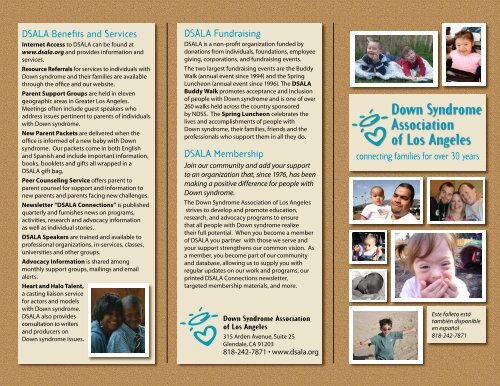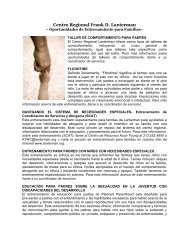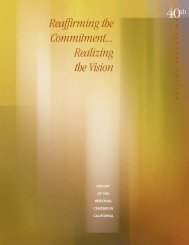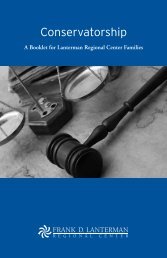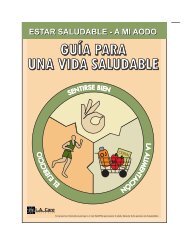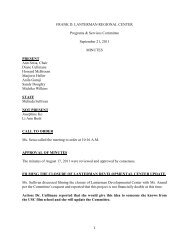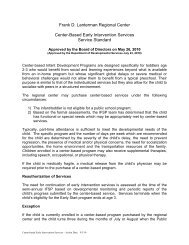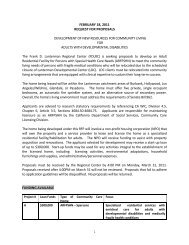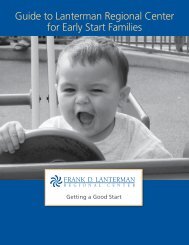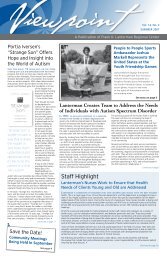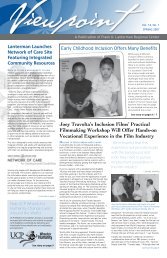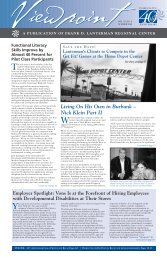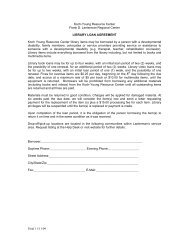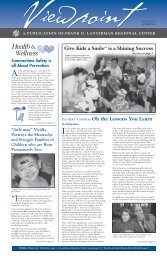Down Syndrome Association of Los Angeles - Frank D. Lanterman ...
Down Syndrome Association of Los Angeles - Frank D. Lanterman ...
Down Syndrome Association of Los Angeles - Frank D. Lanterman ...
You also want an ePaper? Increase the reach of your titles
YUMPU automatically turns print PDFs into web optimized ePapers that Google loves.
DSALA Benefits and Services<br />
Internet Access to DSALA can be found at<br />
www.dsala.org and provides information and<br />
services.<br />
Resource Referrals for services to individuals with<br />
<strong>Down</strong> syndrome and their families are available<br />
through the <strong>of</strong>fice and our website.<br />
Parent Support Groups are held in eleven<br />
geographic areas in Greater <strong>Los</strong> <strong>Angeles</strong>.<br />
Meetings <strong>of</strong>ten include guest speakers who<br />
address issues pertinent to parents <strong>of</strong> individuals<br />
with <strong>Down</strong> syndrome.<br />
New Parent Packets are delivered when the<br />
<strong>of</strong>fice is informed <strong>of</strong> a new baby with <strong>Down</strong><br />
syndrome. Our packets come in both English<br />
and Spanish and include important information,<br />
books, booklets and gifts all wrapped in a<br />
DSALA gift bag.<br />
Peer Counseling Service <strong>of</strong>fers parent to<br />
parent counsel for support and information to<br />
new parents and parents facing new challenges.<br />
Newsletter “DSALA Connections” is published<br />
quarterly and furnishes news on programs,<br />
activities, research and advocacy information<br />
as well as individual stories.<br />
DSALA Speakers are trained and available to<br />
pr<strong>of</strong>essional organizations, in-services, classes,<br />
universities and other groups.<br />
Advocacy Information is shared among<br />
monthly support groups, mailings and email<br />
alerts.<br />
Heart and Halo Talent,<br />
a casting liaison service<br />
for actors and models<br />
with <strong>Down</strong> syndrome.<br />
DSALA also provides<br />
consultation to writers<br />
and producers on<br />
<strong>Down</strong> syndrome issues.<br />
DSALA Fundraising<br />
DSALA is a non-pr<strong>of</strong>it organization funded by<br />
donations from individuals, foundations, employee<br />
giving, corporations, and fundraising events.<br />
The two largest fundraising events are the Buddy<br />
Walk (annual event since 1994) and the Spring<br />
Luncheon (annual event since 1996). The DSALA<br />
Buddy Walk promotes acceptance and inclusion<br />
<strong>of</strong> people with <strong>Down</strong> syndrome and is one <strong>of</strong> over<br />
260 walks held across the country sponsored<br />
by NDSS. The Spring Luncheon celebrates the<br />
lives and accomplishments <strong>of</strong> people with<br />
<strong>Down</strong> syndrome, their families, friends and the<br />
pr<strong>of</strong>essionals who support them in all they do.<br />
DSALA Membership<br />
Join our community and add your support<br />
to an organization that, since 1976, has been<br />
making a positive difference for people with<br />
<strong>Down</strong> syndrome.<br />
The <strong>Down</strong> <strong>Syndrome</strong> <strong>Association</strong> <strong>of</strong> <strong>Los</strong> <strong>Angeles</strong><br />
strives to develop and promote education,<br />
research, and advocacy programs to ensure<br />
that all people with <strong>Down</strong> syndrome realize<br />
their full potential. When you become a member<br />
<strong>of</strong> DSALA you partner with those we serve and<br />
your support strengthens our common vision. As<br />
a member, you become part <strong>of</strong> our community<br />
and database, allowing us to supply you with<br />
regular updates on our work and programs, our<br />
printed DSALA Connections newsletter,<br />
targeted membership materials, and more.<br />
<strong>Down</strong> <strong>Syndrome</strong> <strong>Association</strong><br />
<strong>of</strong> <strong>Los</strong> <strong>Angeles</strong><br />
315 Arden Avenue, Suite 25<br />
Glendale, CA 91203<br />
818-242-7871 • www.dsala.org<br />
<strong>Down</strong> <strong>Syndrome</strong><br />
<strong>Association</strong><br />
<strong>of</strong> <strong>Los</strong> <strong>Angeles</strong><br />
connecting families for over 30 years<br />
Este folleto está<br />
también disponible<br />
en español<br />
818-242-7871
<strong>Down</strong> <strong>Syndrome</strong><br />
<strong>Association</strong> <strong>of</strong> <strong>Los</strong> <strong>Angeles</strong><br />
The <strong>Down</strong> <strong>Syndrome</strong> <strong>Association</strong> <strong>of</strong> <strong>Los</strong> <strong>Angeles</strong><br />
(DSALA), a non-pr<strong>of</strong>it organization, has been<br />
providing services to individuals with <strong>Down</strong><br />
syndrome and their families since 1976. The<br />
DSALA is an affiliate <strong>of</strong> both the National <strong>Down</strong><br />
<strong>Syndrome</strong> Society (NDSS.org) and the National<br />
<strong>Down</strong> <strong>Syndrome</strong> Congress (NDSCcenter.org).<br />
<strong>Down</strong> <strong>Syndrome</strong> and its Effects<br />
<strong>Down</strong> syndrome occurs when an individual has three,<br />
rather than two, copies <strong>of</strong> the 21st chromosome.<br />
This additional genetic material alters the course<br />
<strong>of</strong> development and causes the characteristics<br />
associated with <strong>Down</strong> syndrome.<br />
<strong>Down</strong> syndrome is the most commonly occurring<br />
chromosomal abnormality. One in every 733<br />
babies is born with <strong>Down</strong> syndrome.<br />
DSALA’s Mission Enhance the welfare <strong>of</strong><br />
people with <strong>Down</strong> syndrome and their families.<br />
Connecting families to other families and to valuable<br />
resources in the their local community<br />
Providing access to the most up-to-date information<br />
Promoting development <strong>of</strong> education, counseling,<br />
employment and recreational programs and services<br />
Increasing public awareness, understanding, and<br />
acceptance <strong>of</strong> <strong>Down</strong> syndrome<br />
There are more than 350,000 people living with <strong>Down</strong> syndrome in the<br />
United States.<br />
<strong>Down</strong> syndrome affects people <strong>of</strong> all ages, races and economic levels.<br />
People with <strong>Down</strong> syndrome have an increased risk for certain medical<br />
conditions such as congenital heart defects, respiratory and hearing problems,<br />
childhood leukemia, thyroid conditions, and Alzheimer’s disease. Many <strong>of</strong><br />
these conditions are now treatable, so most people with <strong>Down</strong> syndrome<br />
lead healthy lives.<br />
A few <strong>of</strong> the common physical traits <strong>of</strong> <strong>Down</strong> syndrome include low muscle tone, small stature, an upward<br />
slant to the eyes, and a single deep crease across the center <strong>of</strong> the palm. Every person with <strong>Down</strong> syndrome is<br />
a unique individual and may possess these characteristics to different degrees or not at all.<br />
Life expectancy for people with <strong>Down</strong> syndrome has increased dramatically in recent decades - from 25 in 1983<br />
to 56 today. DSALA has members over 70 years old.<br />
All people with <strong>Down</strong> syndrome experience cognitive delays, but the effect is usually<br />
mild to moderate and is not indicative <strong>of</strong> the many strengths and talents.<br />
Quality educational programs, a stimulating home environment, good health care,<br />
and positive support from family, friends and the community enable people with<br />
<strong>Down</strong> syndrome to develop their full potential and lead fulfilling lives.<br />
People with <strong>Down</strong> syndrome attend school, find work, participate in decisions that<br />
affect them, and contribute to society.<br />
Research<br />
The recent mapping <strong>of</strong> the human genome has<br />
ushered in an unprecedented opportunity for<br />
<strong>Down</strong> syndrome research. For the first time in<br />
our history, scientists now have tools, techniques,<br />
and <strong>Down</strong> syndrome mouse models that are<br />
making it easier to understand the biology <strong>of</strong><br />
<strong>Down</strong> syndrome. We support efforts to identify<br />
treatments aimed at improving<br />
learning, memory, speech and<br />
even the late in life neurological<br />
decline experienced by those<br />
with <strong>Down</strong> syndrome.<br />
Education<br />
• Early Intervention Services provided by the<br />
Regional Centers include physical therapy,<br />
occupational therapy, and speech therapy.<br />
• Children with <strong>Down</strong> syndrome have the right<br />
to receive a quality education and an<br />
appropriate level <strong>of</strong> support services.<br />
Inclusion is based on the belief that every<br />
person has the inherent right to fully participate<br />
in society. By placing children in the most<br />
inclusive environment appropriate for that<br />
child, it will allow them to benefit from the<br />
educational experiences that are fundamental<br />
to every student’s development.<br />
Students with specific needs may also benefit<br />
from other strategies and placements which<br />
include special education classes, resource<br />
rooms, mainstreaming, residential schooling<br />
and home instruction.<br />
• Young adults with <strong>Down</strong> syndrome <strong>of</strong>ten<br />
attend post-secondary programs at community<br />
colleges and community based instruction to<br />
develop independent living and employment<br />
skills. Studies show that this helps students to<br />
excel in academics, employment and life.<br />
818-242-7871 • www.dsala.org


